Putin and his Mom
Edward Bernays renamed “propaganda” to fit its new role after WWI in programming public consciousness . He called it “public relations”; thinking primarily of advertising and marketing. Thanks to Uncle Siggy (Freud) he focused on manipulating the unconsciousness mind with subtle appeals to emotions and existing biases based on deep-rooted instinctual fears and drives.
That approach has developed over the last 100 years and now comprises an entire and very sophisticated informational ecosystem that permeates the media, education, academia, government. WYSIWYG - indeed. But what you see is carefully controlled and curated. And what you get may not be what you really want.
It is about “narratives’ .
Examine Vladimir Putin’s childhood and you will see an eerie parallel to the atrocities playing out in Ukraine today. His life is a stark example of how childhood adversity is the root cause of most social, economic and mental health issues, as well as violence and chronic disease, as the science of positive and adverse childhood experiences demonstrates.
And while we can’t change the Russian president, we can encourage and educate people not to create more Putins by recognizing how childhood adversity impacts us throughout our lives and by integrating solutions into our healthcare, education, justice and economic systems
This is the beginning of an article by Jane Ellen Stevens.
Who’s she?
She has a prestigious resume.
She’s a newspaper and magazine journalist, focusing on health, science and technology for 30 years is founder a news site which focuses on the research, policy and practice of adverse childhood experiences . supported by the Robert Wood Johnson Foundation and The California Endowment.
Her articles have appeared in the Boston Globe, the New York Times, the Washington Post, the Los Angeles Times and National Geographic and she has taught at the University of California Berkeley Graduate School of Journalism. She has a Knight-McCormick Leadership Institute Fellowship and the Reynolds Journalism Fellowship and is on the advisory board for ReportingonHealth.org, of the California Endowment Health Journalism Fellowship. She is also a member of the National Association of Science Writers; Journalism and Women Symposium; and the Online News Association.
Sounds “professional” right. “Trustworthy”? An “expert”?
BUT….
Not professional, Not trustworthy Not expert. Not an “educator”. Not an authority on anything but maybe resume writing.
The introduction to her article is a giveaway - -a patchwork of false facts, distorted history, questionable generalizations, and the pretense of understanding childhood psychology —all aimed at distorting the public image of Vladimir Putin and currying favor with establishment media and academe.
In her article she writes:
Examine Vladimir Putin’s childhood and you will see an eerie parallel to the atrocities playing out in Ukraine today. His life is a stark example of how childhood adversity is the root cause of most social, economic and mental health issues, as well as violence and chronic disease, as the science of positive and adverse childhood experiences demonstrates.
And while we can’t change the Russian president, we can encourage and educate people not to create more Putins by recognizing how childhood adversity impacts us throughout our lives and by integrating solutions into our healthcare, education, justice and economic systems.
Just for the record, there is no “science of positive and adverse childhood experiences” just a lot of hypothesis and theories over which there is much disagreement. And let us keep in mind that Putin’s SMO was undertaken to stop “the atrocities playing out in Ukraine today” carried out by Nazis. Putin has a lot less to blame than people like Ms, Stevens and other apologists.
Characteristic of people like this is the way they manipulate even falsify well-known facts, to justify character assassination without doing any checking or looking at the details.
Living in a rat-infested apartment with two other families, the family had no hot water, no bathtub, a broken-down toilet, little or no heat. His father worked in a factory; his mother did odd jobs she could find. A small child, whose two older siblings are believed to have been lost to war and disease, Putin was left to fend for himself, severely bullied by other children.
With his parents struggling to survive, they were absent or too traumatized to be attentive to their son. There’s no mention of other family members: no grandparents, aunts, uncles, cousins. Kindness and affection didn’t seem to have been part of the child Putin’s world.
Wait a second…. Other sources differ Here’s the Daily Mirror. Of course, they too think Putin is a monster. They just have a different story line. which they develop from an opposite angle.
Putin was the apple of his parents’ eye. They didn’t have much, but whatever they had was given to Putin as a priority.
The fact is that young Volodya got a lot of love. He was the “miracle baby”— the one who survived.
Nor did his parents share a single apartment with two other families as Stevens obliquely suggests– they shared the top floor of a building in which there divided into three apartments, doubtless with some shared facilities.
Putin’s mother was ethnically Jewish according to Soviet records but an Orthodox Christian, not that anyone cared. The other two families were Jewish and, as was common in Soviet communal living, everyone looked after everyone – especially the children – a kind of group parenting. So, while both parents worked, Putin always had someone to look after him. In post-war Russia, children like Putin were precious. They were the future—the reward for the suffering of an awful war that Americans cannot begin to understand.
Yes, there were rats. Which young Putin and his friends enjoyed hunting. There were rats everywhere in Russian cities. Nothing special about this.
Putin was in no way abused or neglected as Stevens suggests.
Yes, he was bullied as a kid-- as happens with smaller kids in any tough working class environment, but not nearly as badly as in an upper-class English style boarding school, such as my father attended, with regular canings for “discipline”.
Young Putin got none of that — but he was brought up with legends of heroes, including the sacrifices of his own family and he had courage and will and fought back— if he had too.
Even as a child he had integrity and principles, and seldom mentioned sympathy for the underdog and the vulnerable, which we see expressed over and over again today. A headline from RT.
But Western writers don’t want to look at actual facts – rather they seek to validate a “narrative” intended to demonize people like Putin, who is routinely compared to Stalin and Mao and, of course, Hitler. If the US is one nation under God, Russia has to be one nation under Satan.
In addition to “Stalinism” and “Maoism” and “Nazism”, you therefore have “Putinism”. When in doubt, the West creates an “ism”. Along with an entire fake narrative which exaggerates, distorts, or simplifies history,
Yes, the face of a mass murderer!
Stevens of course says that Stalin, Mao and Hitler all lacked love as children and turned into monsters. Which is probably true of Hitler, who was beaten savagely by his father. But a little more complicated in the case of both Stalin and Mao who had strong and positive relationships with their mothers. That’s because her shtick is talking about the effects of childhood abuse. She makes a lot of money from telling people what they want to hear. She has degrees — so she can charge more.
Keep in mind that psychology is not a science. It is an industry. A PhD in this field does not qualify you to really do anything but charge outrageous fees for talks or therapy or writing articles for Psychology Today. Of course, there are a lot of dedicated people who just want to help and are good at it— and don’t do it for hte money But they are not good at it because they studied it — they are good at it because they are good people.
Chappy’s Childhood
“ I had a difficult childhood. My Dad wasn’t around. My mom disappeared. And all my brothers and sisters. I was sooooooo lonely!
I ended up eating lizards, snakes and frogs.
Some strange men came and did an operation on me and cut my ear and then put me back on the street where a car hit me and broke my hip.
Strange men in white coats—vets— did something. The operation was sooooooooooooooo painful! I had a little cage and I had to pee on a pet sheet. And in my water bowl. I was always afraid.
But then some nice ladies took me in and gave me tuna paste and I had lots of kitten friends who loved me. Finally, Julian and Ichi adopted me. I didn’t’ trust them at first of course!
But I have realized they LOVE me. And I LOVE them. And besides I get tuna paste.
Now I do my best to train Julian to be a good….ummm….cat? He’s not smart and needs constant supervision, It requires patience.”
Please buy me — and Ichi — and even Julian — a coffee. Click here!
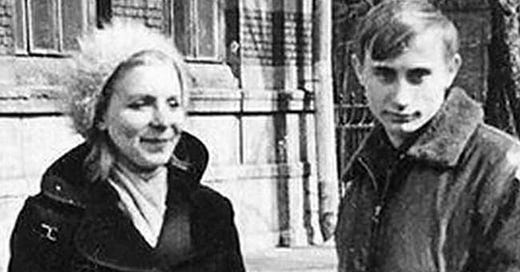



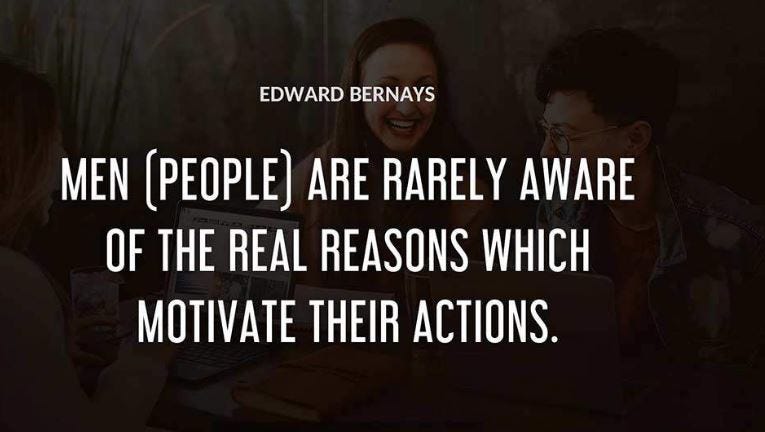
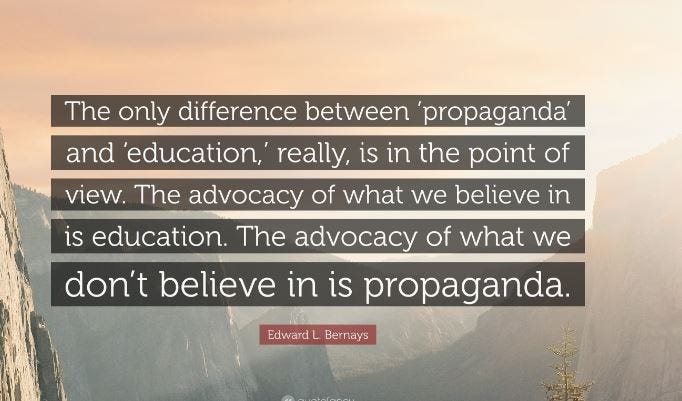

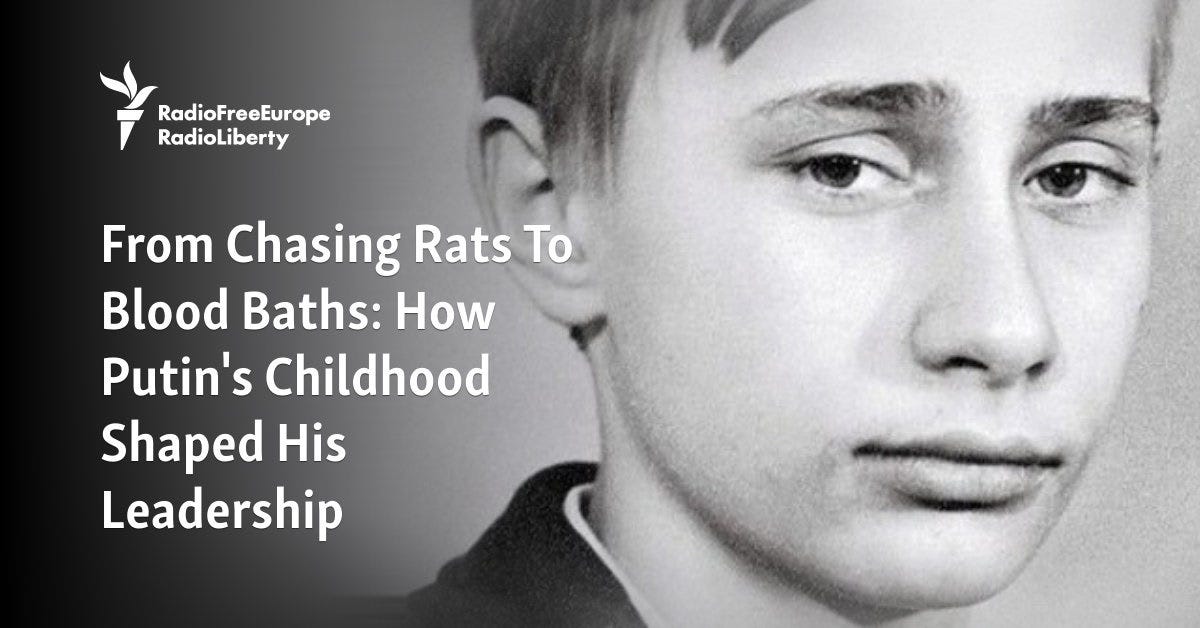
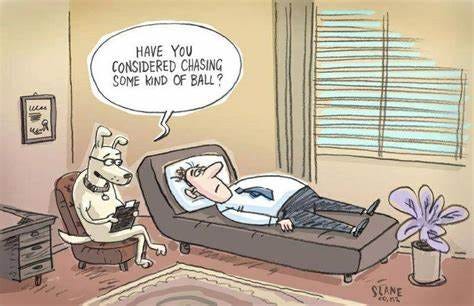
Thanks for exposing this kind of nonsense posing as serious psychology. Putin was loved by his parents which is important for good mental health. Adversity during childhood far from making Putin a murderer (ridiculous attempt to influence) has in fact made him determined to fight against injustice. He is very much aware that children have no power against privileged adults who wage wars with no thought for the victims. It is those with privileged backgrounds who are much less likely to have empathy for those less fortunate. Putin is the best leader the Russians have ever had. He has lifted up his people after the collapse of the Soviet Union and the dreadful years of Gorbachev and Yeltsin. It's a pity that western leaders are the bought puppets of western oligarchs. Putin is the real deal: a true leader of his people.
Putin has done more for his country & citizens, than every Western ruler put together